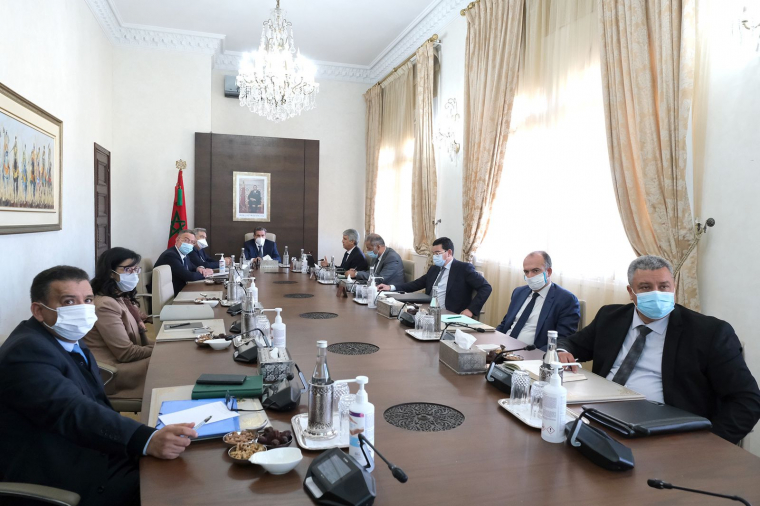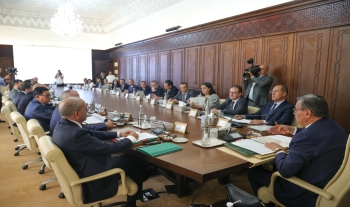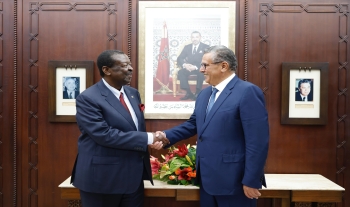Press release: The government launches a program to mitigate the effects of the lack of rainfall in implementation of the High Royal Instructions

By Royal Decree, the Hassan II Fund for Economic and Social Development will contribute three Billion dirhams to this program.
The program consists of three main axes related to the protection of animal and plant stock, water scarcity management, agricultural insurance, and reducing the financial burdens on farmers and professionals.
Following the proactive instructions of His Majesty King Mohammed VI, May God Assist Him, regarding taking the necessary measures to confront the effects of the lack of rainfall on the agricultural sector, the Head of Government, Mr. Aziz Akhannouch, chaired, on Thursday, February 17, 2022, a meeting on the necessary emergency measures in this regard, in the presence of Mr. Abdelouafi Laftit, Minister of the Interior, Mr. Mohamed Sadiki, Minister of Agriculture, Fisheries, Rural Development, Water and Forests, and Mr. Fouzi Lekjaa, Minister Delegate to the Minister of Economy and Finance, in charge of Mr. Tariq Sijilmassi, Head of Collective Management of the Agricultural Loan Group, and Mr. Hicham Belmrah, CEO of the Moroccan Agricultural Insurance Mutual and the Moroccan Central Insurance Cooperative.
In line with the High Instructions and the special royal care that His Majesty has always given to the inhabitants of the rural world and to all components of the agricultural sector, the Government has drawn up an exceptional programme to mitigate the effects of the lack of rainfall and to limit its impact on agricultural activity by providing assistance to the farmers and livestock breeders concerned.
The program is based on 3 main axes, the first is related to the protection of animal and plant stock and the management of water scarcity, the second axis targets agricultural insurance, while the third axis is concerned with reducing the financial burdens on farmers and professionals.
The Hassan II Fund for Economic and Social Development, on the order of His Majesty the King, will contribute three Billion dirhams to this program.
The work program of the first part, which has a financial cost of 3 Billion dirhams, is distributed as follows:
Distributing 7 million quintals of subsidized barley to livestock breeders and 400,000 tons of compound feed to dairy cattle breeders to mitigate the effects of higher feed prices and reduced pasture savings at a total cost of 2.1 Billion Dirhams.
Vaccinating and treating 27 million sheep and goats and 200,000 camels and treating bees against Farwaz disease with a budget of 300 million Dirhams.
Rehabilitating small and medium irrigation orbits with the aim of maintaining equipment and creating jobs through the development and rehabilitation of traditional water intakes and “Khettaras” with a budget of 255 million dirhams.
Supplying livestock through the preparation and equipping of water points, the acquisition of tankers and tanker trucks, and the development of pasture on an area of 10,000 hectares with a budget of 224 million dirhams.
Supplementary irrigation for the sustainability of newly cultivated orchards (2 to 5 years) planted within the framework of solidarity agriculture on an area of 55,000 hectares with a total budget of 121 million dirhams.
With regard to the second pillar of the program, related to multi-risk insurance for the current agricultural season, work will be done to accelerate the boldest drought insurance for farmers, with a capital insured by farmers amounting to 1.12 Billion dirhams on an area of 1 million hectares.
As for the third pillar, related to reducing the financial burdens on farmers and professionals, a financial amount of 6 Billion dirhams has been allocated to it, and aims to reschedule the farmers' debt, finance the supply of wheat and livestock feed to the national market, in addition to financing innovative investments in the field of irrigation.
In a related context, at the end of the meeting, the Head of Government called on the various stakeholders to coordinate among themselves and approach the policy of listening and proximity to citizens and farmers for the optimal implementation of this program, in partnership with local authorities, for the success of this royal program.







